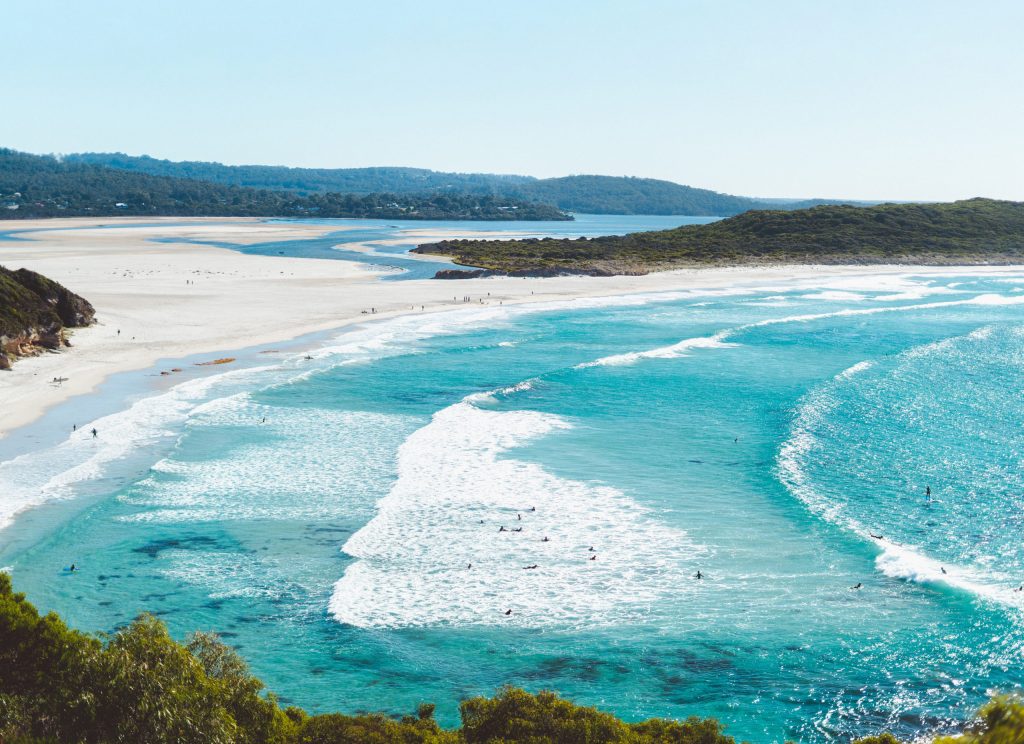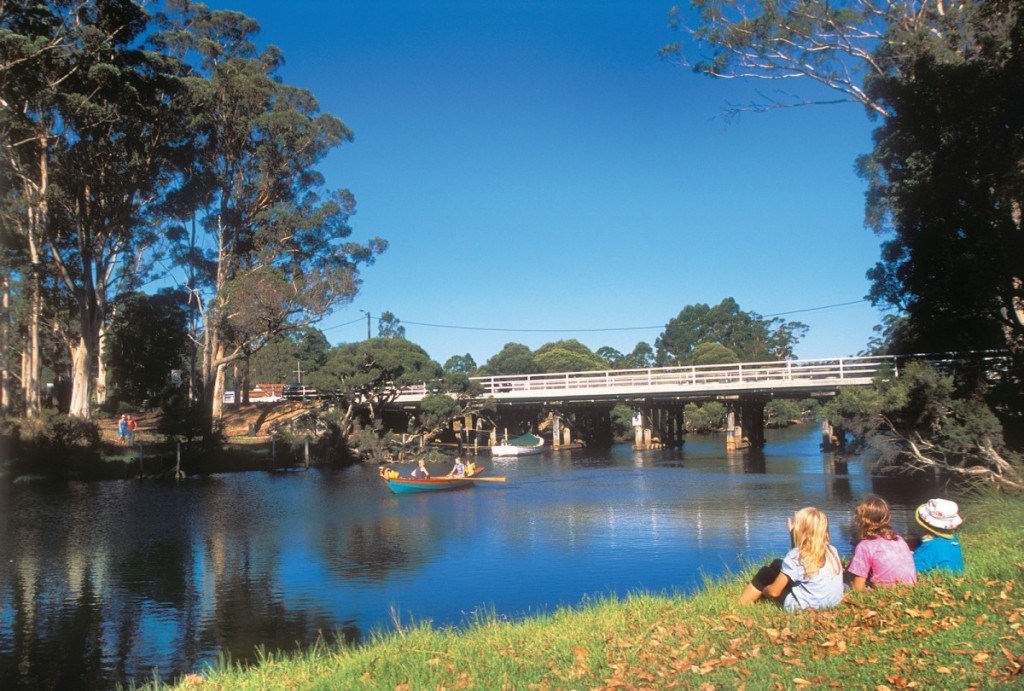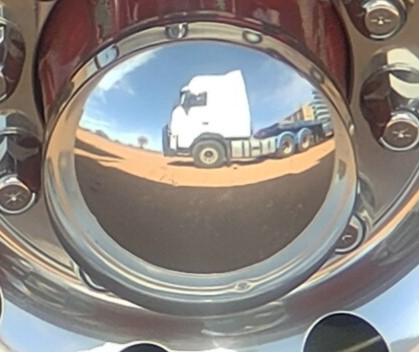Journal: 117

There are only two bitumen roads out of Western Australia, the Eyre Highway across the Nullarbor, and the Great Northern Hwy through to Katherine and Darwin (and a year ago, the northern route was out for months, the bridge at Fitzroy Crossing washed away). The Great Central Road, pictured above, 1300 kms across the Great Victoria and Gibson deserts, from north of Kalgoorlie to the Stuart Hwy south of Alice Springs (map), is the only other option (to the best of my knowledge, the WA end of the Gunbarrel Hwy is only for adventurers).
A week ago, another truckie and I loaded a toilet block and a crib room at Cape Preston on the coast near Karratha, and after three days driving, daylight only, we were overwidth, we delivered them to a bit of a clearing in the bush, 80 kms up the Great Central Road from Laverton, where they will form the basis of a roadworkers camp. Bitumen is coming! According to Main Roads WA, sealing will take place over the next 8 or 9 years (ABC story).
Late last year Dragan offered me a load up the Road to a mine in the Musgrave Ranges, near the NT border. I was tied up with something else and couldn’t do it. About which I am sorry and not sorry. You can see the corrugations in the photo; it’s a very long way at 40 kph, and tough on the equipment.
I’ve been working flat out the last couple of months, even my home time is mostly dealing with truck (and business) stuff. So I’m getting plenty of driving time and therefore plenty of audiobook time. The problem is writing them up. I’m due out again tomorrow (Saturday), loading both trailers in the morning to run up the coast to Paraburdoo.
Here’s a summary of the better parts of my reading – I get through a lot of dross – and maybe I’ll find time to post some reviews in a week or two.
George Orwell, Burmese Days: This is Orwell’s first novel, published in 1934, initially in the US as it was thought to be too accurate a picture of the Burmese town Katha (Kyauktada in the novel), and the characters too easily identified. Orwell (1903-1950) was in Burma, in the Indian Imperial Police, from Oct 1922 to Jul 1927. He became fluent in Burmese. Katha was his final posting, and he had his 24th birthday there. His protagonist, Flory, a timber merchant, is an old 35, weary and very self conscious about the birthmark that covers nearly all one side of his face.
The story is that a pretty white girl, Elizabeth, arrives from England to stay with her uncle and aunt. Flory abandons his Burmese mistress to court her, with some initial success (Elizabeth is desperate to secure a husband). It’s a small expat community, and Orwell’s descriptions of the men implies that he found some of the outspoken racism impossible to stomach.
Orwell here appears very bitter about women and about the marriage mart. I’m not sure where that comes from.
Peter Farris, The Devil Himself: This work of Southern (US) Noir, is a very readable crime thriller featuring an unlikely (and not sexual) relationship between a prostitute/sex slave on the run and an old farmer/bootlegger. I bought it based on Emma’s review, and while I don’t regret it, it had far too much violence for my taste.
Claudia Dey, Heartbreaker: Audiobooks get mixed up in my head and, at a distance, I struggle to tell them apart. To make matters worse, the Goodreads summary for Heartbreaker doesn’t fit my memory of the book at all. I came to it via a discussion of another Dey book in Buried in Print. The setting is a remote community in Canada’s north, a cult whose leader has died but which continues on. A woman, the only person to ever do so, comes to the community and marries a local, and then, 15 years later, drives off, disappears. It is not SF, not even particularly dystopian, but what really put me off is that the narrator of the middle third is a dog. Here’s a proper review.
Richard Flanagan, First Person: I’ve read a few Flanagan’s without finding one I liked. I may even have been told to stop reviewing him. But I found the premise of First Person atrractive – a book about writing a book, about ghostwriting the autobiography of a well known business fraudster. And I did enjoy that part of the story, but it wasn’t the main part. Once again this is a book about relationships between guys, and despite the failing marriage in the background, it’s full of guy stuff. For some reason a book about a writer writing just had to include a car chase, in a stolen Valiant, in reverse down a city lane. You lost me there Richard. (Kimbofo’s review)
Maaza Mengiste, The Shadow King: This was my Black Africa read for April. I really do hope I find time to listen to it again and to write it up. In brief, The Shadow King is Historical Fiction, written by a woman who left Ethiopia aged 4, covering Italy’s invasion of Ethiopia in 1935. So that if it is a family story, it would be the story of her great grandparents (the Guardian says grandfather).
The story is framed as Hirut, a mature Ethiopian woman waiting at the railway station to meet a photographer who had been attached to the invading Italians back when she was young. Over the course of the novel what we learn about their interactions during the invasion is surprising, much different from what I first assumed.
In the story proper, Hirut, is an orphan girl who is a slave/maid to Kidane and Aster. Kidane is often away, rallying locals to join him in the resistance. Aster and Hirut, though actively opposed by Kidane, eventually form a corps of women fighters. It’s a compelling story, told from the points of view of a number of the participants, including Haile Selassise, who is forced into exile in England.
One last piece of news. My sister in law Jo, otherwise Emeritus Professor Jo-Anne Reid, has been asked to give a talk on Kylie Tennant’s Tiburon, on the 90th anniversary of its publication, next week, in the town, Canowindra (in central NSW), where it is set. And the invitation to speak was based on the review she wrote for the Australian Women Writers Challenge site, last year. See, people do read us!
.
Recent audiobooks
L Fenton & L Steinke (F, USA), How to Save a Life (2020)
Fiona K Foster (F, USA), The Captive (2021) Crime
Leddy Harper (F, USA), The Secret Baby (2019) RomCom
Veronica Henry (F, USA), Bacchanal (2021)
Laura Lipman (F, USA), And When She was Good (2012)
Maaza Mengiste (F, Ethiopia/USA), The Shadow King (2019)
Peter Farris (M, USA), The Devil Himself (2017) Crime
Richard Flanagan (M, Aust/Tas), First Person (2017)
Claudia Dey (F, Can), Heartbreaker (2018) Dystopian
Currently Reading
George Orwell (M, Eng), Burmese Days (1934)
Brett Easton Ellis (M, USA), American Psycho (1991)
AWWC Apr 2024
| Date | Contributor | Title |
| Wed 3 | Elizabeth Lhuede | Commemorating Anzac Day 1924 |
| Wed 10 | Catherine Helen Spence | Woman’s Place in the Commonwealth |
| Wed 17 | Bill Holloway | Catherine Helen Spence |
| Wed 24 | Whispering Gums | Lillian Pyke, and “Mary’s mother” |















